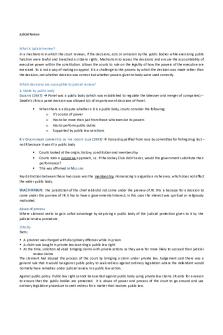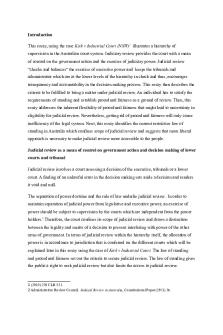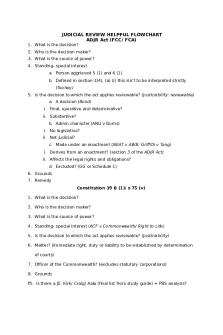Judicial Review PDF

| Title | Judicial Review |
|---|---|
| Course | Public Law and Statutory Interpretation |
| Institution | University of South Australia |
| Pages | 6 |
| File Size | 176.9 KB |
| File Type | |
| Total Downloads | 27 |
| Total Views | 155 |
Summary
statutory interpretation - judicial review...
Description
JUDICIAL REVIEW What is judicial review?? Judicial review involves the courts examining decisions of the Executive. To have a decision judicially reviewed, an error in the decision-making process must be identified; the outcome or substance of an executive decision is not open to judicial review. Judicial review enforces the of the rule of law: Church of Scientology v Woodward; A v Hayden (No 2): Gov Secret Intelligence training operation where they smashed down a hotel door and held machine guns – Court said that executive was not immune to the law The right to seek judicial review is fundamental principle of common law; it is not dependant on statute (unlike merits review). Two types: Judicial review of administrative action and review of primary legislation (HCA has power – s 67 Constitution, Fed Court has power – s 39B Judiciary Act)
Where does the power come from? SOUTH AUSTRALIA: -
From its inception in 1837, the Supreme Court of South Australia was vested with all of the jurisdiction and powers of the Superior Courts of Westminster; which included power to judicially review decisions of public officials
-
The jurisdiction to exercise judicial review is now codified in section 17 of the Supreme Court Act 1935 (SA)
-
State Supreme Courts have a constitutionally entrenched judicial review jurisdiction: Kirk v Industrial Court
-
Supreme Court cannot judicially review Cth decisions: s 9 AD(JR) Act
FEDERAL: The High Court has original judicial review jurisdiction (s 75(v) and (iii) of the Constitution). -
s 75(v) provides original jurisdiction in all matters where writ of mandamus/prohibition/injunction is sought
-
High Court held in Bodruddaza v Minister for Immigration and Multicultural Affairs that it can grant certiorari as a remedy ancillary to the grant of prohibition and mandamus
-
extends to judicial review decisions of Federal Court
-
Decisions made by a Supreme Court when it is exercising federal jurisdiction are not subject to review under s 75 (v)
The Federal Court has judicial review jurisdiction: s 39B Judiciary Act 1903 (Cth); s 8 AD(JR) Act 1977 (Cth) The Federal Circuit Court has jurisdiction to hear judicial review applications: s 8 AD(JR) Act 1977 (Cth) -
State Supreme Court, HCA, Federal Court can judicially review the exercise of non-statutory powers – remaining prerogative powers of the Executive (source s 61 Constitution): Ruddock v Vadarlis
-
Note: AD(JR) Act only applies to decisions made under statute
Remedies available at common law (prerogative writs) -
Certiorari: sets aside the decision because of an absence or excess of jurisdiction, jurisdictional error or error of law on the face of the record, failure to observe the requirements of procedural fairness or fraud – QUASHES a decision that has not been validly made
-
Mandamus: compels a public authority to perform a duty – used when authority refuses or fails to make a decision that it is obliged to make
-
Prohibition: prevents a public authority from acting beyond its jurisdiction or in contravention of the requirements of the requirements of procedural fairness
-
Quo warranto: prevents a person from wrongfully exercising, or purporting to exercise, functions of a public character on the basis that they do not validly hold the relevant public office
Equitable Remedies -
a person wishing to challenge an administrative decision may also apply for equitable remedies
-
Injunction: an order of the Court restraining the commission of a wrongful act (prohibitory injunction) or directing that something must be done (mandatory injunction)
-
In SA, mandatory injunctions cannot be issued against the Crown (s 7 Crown Proceedings Act)
-
Declaration: statement made by the Court about a legal issue – does not compel anything but useful in admin law because Crown and decision makers will act in accordance with the declaration
Remedies are discretionary!! court may refuse to grant a remedy including where: -
Where a right of appeal is available to challenge the decision and that right has not been exercised, e.g. Weinel v Judge Parsons
-
Where the grant of a remedy would interfere with the orderly conduct of criminal proceedings in a lower court - the person affected will have a right of appeal if they are wrongly convicted, e.g. Chief Executive Officer of Customs v Jiang
-
Where the grant of a remedy would be futile or where the error is minor and the costs of rectification would be disproportionate to the practical effect of the error, e.g. NRMA Insurance v Ainsworth
Grounds for Review AD(JR) Act Section 5 Administrative Decisions (Judicial Review) Act 1977 (Cth) sets out grounds of review (replicates those available at common law): -
time limit to bring judicial review application is usually 28 days
(1) An aggrieved person may apply to the Federal Court or Federal Circuit for a review on one or more of these grounds: (a) breach of the rules of natural justice (b) procedures required by law not followed (c) lack of jurisdiction (d) decision not authorised by enactment and its purpose (e) improper exercise of power conferred by enactment (f) error of law (g) induced or affected by fraud (h) no evidence to justify decision (i) contrary to law (2) reference to improper exercise is (a) taking an irrelevant consideration into account (b) failing to take a relevant consideration into account (c) exercise of a power for a purpose other than a purpose for which the power is conferred (d) exercise of a discretionary power in bad faith (e) exercise of a personal discretionary power at the direction or behest of another person (f) so unreasonable that no reasonable person could have so exercised the power (g) exercise of a power in such a way that the result of the exercise of the power is uncertain
(h) any other exercise of a power in a way that constitutes abuse of the power (3) (1)(h) shall not be made out unless (a) he person who made the decision was required by law to reach that decision only if a particular matter was established (b) he person who made the decision based the decision on the existence of a particular fact, and that fact did not exist Powers of Fed Court and Circuit Court: (s 16(1)) (a) a decision may be quashed or set aside; (b) the matter may be referred back to the decision-maker with directions given by the Court; (c) a declaration may be made; (d) a mandatory or prohibitory injunction may be issued Ultra Vires: decision maker exceeded their jurisdiction or powers; not empowered under statue (narrow) or went about decision-making process in a way that Parliament did not intend (broad) Taking into account an irrelevant consideration or failure to take into account a relevant consideration: -
whether the list is exhaustive or inclusive, i.e. is it permissible to take into account additional matters
-
one needs to infer what is relevant or not relevant by looking at the subject matter, objects and scope of the Act and the particular provision that is being applied
Improper Purpose: The issue whether the jurisdiction and power conferred by the Parliament has been used for a purpose that was intended or contemplated by the Parliament when it passed the legislation or has it been used for some extraneous purpose -
eg Sydney Municipal Council v Campbell:
No evidence: Provided that there is some evidence, the weight attached to evidence is not a matter for the court to decide on judicial review Unreasonableness: decision will be set aside if it is so unreasonable that no reasonable decisionmaker could have made such a decision: Associated Provincial Picture Houses Ltd v Wednesbury -
it is generally best to focus on the other grounds which are easier to establish
-
however, HCA in Minister for Immigration and Citizenship v L stated: ‘unreasonableness is a conclusion which may be applied to a decision which lacks an evident and intelligible justification’
Uncertainty: ongoing debate as to whether uncertainty is a ground, of itself, for challenge at common law
Procedural Fairness: If a person’s interest will be adversely affected by the decision and that interest may be compared with the interest that gave the plaintiffs standing to commence the proceedings, there exists a duty to accord procedural fairness unless excluded by statute (Plaintiff S10/2011 v Minister for Immigration and Citizenship). (1) The Hearing Rule A person is entitled to a reasonable opportunity to respond to adverse material before the decision is made: Kioa v West (2) Bias Rule The test for bias is: whether an informed reasonable observer would reasonably apprehend that the decision maker may not approach the matter with an impartial mind: Ebner v Official Trustee -
bias need not be operative
Objective standard: that of the reasonable person (third party): George v Rockett -
The reasonableness of the decision makers’ grounds of suspicion or of being satisfied must be sustainable objectively – even if the decision maker did not personally hold that belief.
Justiciability If a decision is not justiciable, the Court lacks jurisdiction to deal with the matter. -
where there is a lack of objective criteria to determine issue
-
some decisions are the concern of the executive: separation of powers
-
eg Minister for Arts Heritage and Environment v Peko-Wallsend: found the decision of Cabinet was non-justiciable, primarily because it involved 'complex policy questions relating to the environment, the rights of Aborigines, mining and the impact on Australia's economic position
Standing
The common law and the AD(JR) Act require that only a person who has standing can commence proceedings seeking judicial review. CONMON LAW -
Certiorari and prohibition was the person is ‘aggrieved’; suffer damage greater than that of ordinary public
-
Mandamus required the person to establish the existence of a legal right to enforce the public duty in question
-
Declaration or injunction requires a ‘special interest’ in the subject of the proceedings mere intellectual interest or emotional concern does not suffice: Australian Conservation Foundation Inc v Commonwealth
-
However, in Onus v Alcoa, accepted as having standing on the basis that they were more affected than the general community
AD(JR) Act -
Section 5(1) states standing is based upon ‘a person aggrieved’: defined in s 3(4)(a)(i) as ‘a person whose interests are adversely effected’
-
the term should not be given a narrow construction; not limited to legal rights at stake – person will be aggrieved if their interests will be more directly affected than public at large: Tooheys Ltd v Minister for Business and Consumer Affairs
MERITS REVIEW -
particular type of appeal that does not have technical constraints like most appeals
-
appellate body will remake the decision – stand in the shoes of the decision maker
-
reviews the outcome of the decision
-
generally conducted by tribunals eg SA - South Australian Civil and Administrative Tribunal Act 2013 (SA) SACAT, FEDERAL - Administrative Appeals Tribunal Act 1975 (Cth) AAT
-
right to seek merits review must be conferred by statute – no common law right...
Similar Free PDFs

Judicial Review
- 15 Pages

Judicial Review
- 50 Pages

Judicial Review
- 6 Pages

Judicial Review
- 40 Pages

Judicial Review
- 7 Pages

Judicial Review Complete 2
- 54 Pages

Judicial Review (ALL!)
- 8 Pages

Judicial Review- irrationality
- 4 Pages

Judicial Review notes
- 1 Pages

Analisis Sejarah Judicial Review
- 5 Pages

ADMIN LAW Judicial Review
- 5 Pages

Ilegality - Judicial Review
- 5 Pages

Judicial Review Notes
- 6 Pages

Judicial Review Essay
- 3 Pages

Judicial Review Flowchart
- 4 Pages
Popular Institutions
- Tinajero National High School - Annex
- Politeknik Caltex Riau
- Yokohama City University
- SGT University
- University of Al-Qadisiyah
- Divine Word College of Vigan
- Techniek College Rotterdam
- Universidade de Santiago
- Universiti Teknologi MARA Cawangan Johor Kampus Pasir Gudang
- Poltekkes Kemenkes Yogyakarta
- Baguio City National High School
- Colegio san marcos
- preparatoria uno
- Centro de Bachillerato Tecnológico Industrial y de Servicios No. 107
- Dalian Maritime University
- Quang Trung Secondary School
- Colegio Tecnológico en Informática
- Corporación Regional de Educación Superior
- Grupo CEDVA
- Dar Al Uloom University
- Centro de Estudios Preuniversitarios de la Universidad Nacional de Ingeniería
- 上智大学
- Aakash International School, Nuna Majara
- San Felipe Neri Catholic School
- Kang Chiao International School - New Taipei City
- Misamis Occidental National High School
- Institución Educativa Escuela Normal Juan Ladrilleros
- Kolehiyo ng Pantukan
- Batanes State College
- Instituto Continental
- Sekolah Menengah Kejuruan Kesehatan Kaltara (Tarakan)
- Colegio de La Inmaculada Concepcion - Cebu
